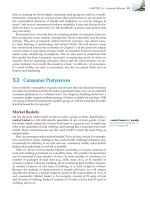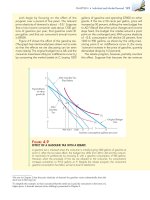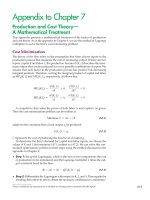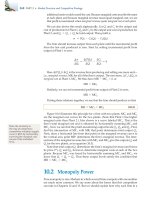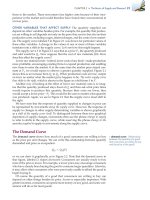(8th edition) (the pearson series in economics) robert pindyck, daniel rubinfeld microecon 119
Bạn đang xem bản rút gọn của tài liệu. Xem và tải ngay bản đầy đủ của tài liệu tại đây (155.69 KB, 1 trang )
94 PART 2 • Producers, Consumers, and Competitive Markets
Clothing
(units per month)
l3
F IGURE 3.19
REVEALED PREFERENCE:
FOUR BUDGET LINES
Facing budget line l3 the individual chooses E,
which is revealed to be preferred to A (because
A could have been chosen). Likewise, facing
line l4, the individual chooses G which is also
revealed to be preferred to A. Whereas A is preferred to all market baskets in the green-shaded
area, all market baskets in the pink-shaded area
are preferred to A.
l1
E
l4
l2
A
B
G
Food
and to the right of AE and then fall below the line at E—in which case the indifference curve would not be convex. By a similar argument, all points on AG or
above are also preferred to A. Therefore, the indifference curve must lie within
the unshaded area.
The revealed preference approach is valuable as a means of checking
whether individual choices are consistent with the assumptions of consumer
theory. As Example 3.6 shows, revealed preference analysis can help us
understand the implications of choices that consumers must make in particular circumstances.
E XA MPLE 3.6 REVEALED PREFERENCE FOR RECREATION
A health club has been offering
the use of its facilities to anyone
who is willing to pay an hourly
fee. Now the club decides to
alter its pricing policy by charging
both an annual membership fee
and a lower hourly fee. Does this
new financial arrangement make
individuals better off or worse off
than they were under the old arrangement? The
answer depends on people’s preferences.
Suppose that Roberta has $100 of income available each week for recreational activities, including exercise, movies, restaurant meals, and so on.
When the health club charged a fee of $4 per hour,
Roberta used the facility 10 hours per week. Under
the new arrangement, she is required to pay $30
per week but can use the club for only $1 per hour.
Is this change beneficial for
Roberta? Revealed preference
analysis provides the answer. In
Figure 3.20, line l1 represents the
budget constraint that Roberta
faced under the original pricing
arrangement. In this case, she
maximized her satisfaction by
choosing market basket A, with
10 hours of exercise and $60 of other recreational
activities. Under the new arrangement, which shifts
the budget line to l2, she could still choose market basket A. But because U1 is clearly not tangent
to l2, Roberta will be better off choosing another
basket, such as B, with 25 hours of exercise and
$45 worth of other recreational activities. Because
she would choose B when she could still choose A,
she prefers B to A. The new pricing arrangement

